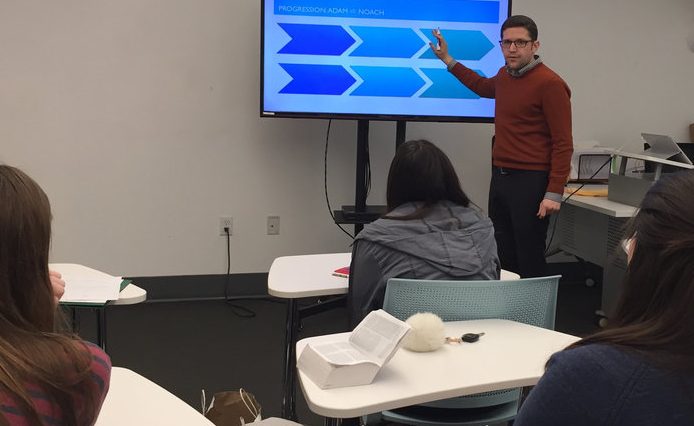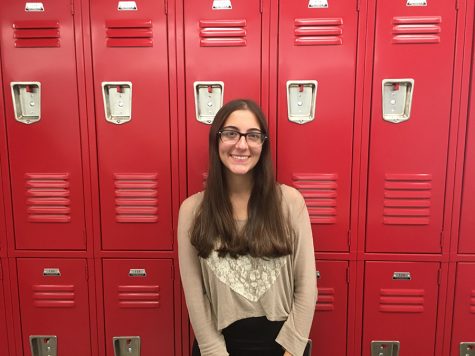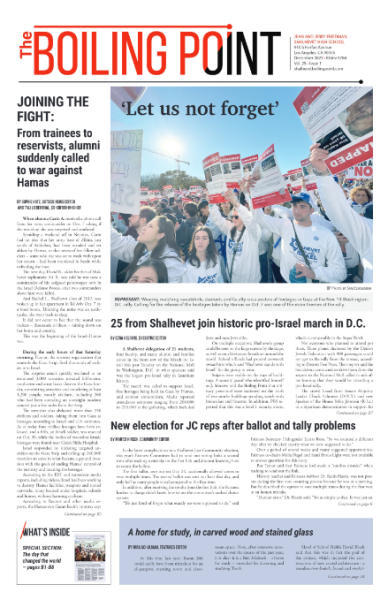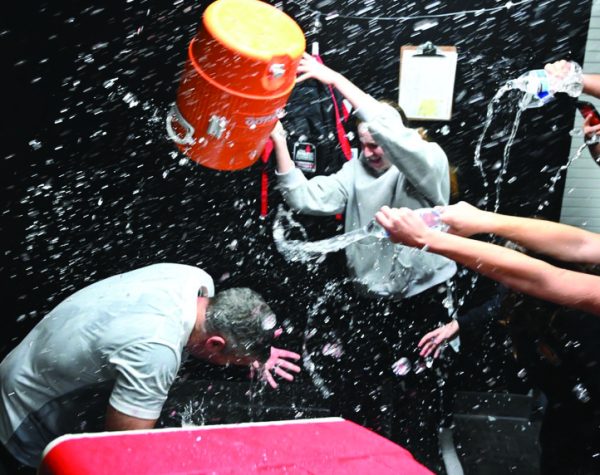Anonymous surveys improve classes by giving students a voice
CHANGE: Rabbi David Block responded to student surveys by handing out his slides. Now, students can pay attention and have good notes.
April 6, 2017
Judaic Studies teacher Rabbi David Block likes to present basic information to his classes using slides, and then teach the ideas and concepts that tie these facts together.
But at the end of the first semester, he learned that his students felt they were spending too much time copying the slides, and not enough on understanding the concepts.
To solve the problem, the class brainstormed together and decided Rabbi Block would hand out copies of the slides with areas to write notes on so that the students could pay attention to the bigger concepts.
Rabbi Block learned about the problem because f Shalhevet’s administration introduced end-of-semester student surveys, anonymous questionnaires that were taken on Google Docs during class time and given to teachers a few weeks later.
Some teachers did not address the surveys with their classes, some discussed them briefly and others, like Rabbi Block, took them to heart.
“I’ve actually noticed there hasn’t been a decrease in note-taking,” said Rabbi Block midway through the third quarter. “Now they are processing things that are bigger concepts, which is exactly what I want them to get out of the class. So that was great feedback.”
This year’s surveys were brand new, written by the Educational Leadership Team beginning last year and worked on over the summer and fall. They were designed to get specific information teachers could use to improve, according to Principal Reb Noam Weissman.
The faculty saw the surveys first and was able to give feedback before they were finalized, said Director of College Counseling Ms. Aviva Walls.
The idea was brought to Reb Noam Weissman and General Studies Principal Mr. Daniel Weslow last year by current senior Micha Thau. All classes, including General Studies, Judaic Studies and electives, were included.
“The administrators can only get so much from sitting in on classes,” said Micha. “I think the best judge of how teachers are doing are the actual students that they are teaching.”
Students said the surveys had a positive impact in the classes where they were discussed, although many wished they had experienced the power of their personal feedback even more.
Senior Eitan Ohana praised the response of AP Computer Science teacher Dr. Josh Sharfman.
“I haven’t really noticed many responses from teachers.” Eitan said. “The only teacher of mine who really responded was Dr. Sharfman. He actually took almost the whole class to respond to the surveys and tell us how he wants to change the class because of it.”
Teachers who remembered the previous surveys said they had been less successful.
According to History and SAS Psychology teacher Ms. Tove Sunshine, the main reason for that problem – and the eventual pause on student surveys until this year – was that some students took advantage of their anonymity and used it to lash out.
“It was clear they had not been taken seriously by the students and some of them were gratuitously insulting or unpleasant,” said Ms. Sunshine.
Reb Noam Weissman said that if unpleasant responses from students had occurred again, it would have been a clear indication to end surveys. But at least 90 percent of the students provided valuable feedback, he said.
“What we are trying to do here is to put the students at the center – we want to know what you think,” Reb Weissman said, announcing the surveys at Town Hall the week before the process began.
The surveys themselves were composed of two parts. In the first section, students were asked if they strongly disagreed, strongly agreed, or somewhere in between regarding various statements about a teacher and his or her class.
One such statement on the survey was, “The teacher is responsive to my learning needs.”
The second section was more open-ended, in which students could also write improvements they thought would be beneficial to the class.
For example, students were asked, “Which assignments and/or activities have you found to be most rewarding? Why?” and “What recommendations would you make to improve the class in the next year?”
After the surveys were completed in December, they were discussed and analyzed by the faculty and administration in January. The goal was for teachers to discuss with their students what issues were present in the class, what could and couldn’t be changed, and how.
“It depends on the student…but I see it being very helpful,” said senior Seiji Shaw. “Even just the first section provides very valuable feedback.”
Sophomore Donna Grunfeld thought the questions could have been geared more towards teaching.
“If I thought that the teacher was not necessarily good, I’d still give them a really good grade simply because they are kind,” said Donna.
Dean of Students Mr. Jason Feld said the questions had the provided useful answers.
“I think many of us will use the data to hopefully improve,” Mr. Feld said. “It could be valuable for the Just Community and the students to understand we talk a lot about how your voice and your opinion matters. This is a way of demonstrating that.”
Many students felt the same way.
Freshman Danya Helperin saw the surveys as an opportunity to say she wanted to have more projects and engaging activities in class.
“I’m definitely going to take it seriously,” said Danya during the week the surveys were being taken, “and I certainly hope that my friends are taking it seriously, because I would want to see classes get better for me and for how I learn.”
Micha Thau was pleased with how the process went, but wished the surveys covered more departments at Shalhevet, since students are interacting with faculty outside of the classroom environment, such as in Ed Support, counseling, and Israel and college guidance.
Co-Editor-in-Chief Maayan Waldman contributed to this story.














